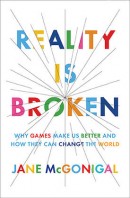 Every reader has biases; about books, yes, but also about life. One of my biases is against tech-utopianism. I run a website. I play a lot of online Scrabble, and played a lot of Nintendo Tetris in the mid-1990s. I opt to spend a lot of time with my computer. But I wish I spent less. And I think my generation (and those younger) has a relationship to video games that can only be called regressive. So the big idea in Jane McGonigal’s Reality is Broken — that video games should be embraced, and designed to do things like help us cure world hunger and learn to love household chores — strikes me as deeply unappealing, if not straight-up bonkers.
Every reader has biases; about books, yes, but also about life. One of my biases is against tech-utopianism. I run a website. I play a lot of online Scrabble, and played a lot of Nintendo Tetris in the mid-1990s. I opt to spend a lot of time with my computer. But I wish I spent less. And I think my generation (and those younger) has a relationship to video games that can only be called regressive. So the big idea in Jane McGonigal’s Reality is Broken — that video games should be embraced, and designed to do things like help us cure world hunger and learn to love household chores — strikes me as deeply unappealing, if not straight-up bonkers.
She has won over some reviewers. It’s not shocking that Cory Doctorow is a fan. But even “avowed Luddite” Janice P. Nimura, in the Los Angeles Times, is seduced by the book’s visions: “Instead of dismissing games as frivolous entertainment or trying to unplug our children, we should take a close look at what games provide and figure out how to make reality as exciting and rewarding — as ‘gameful’ — as the virtual world.” And Pat Kane in the Independent, initially skeptical, concludes: “Armed with an impressive bibliography in psychology and neuroscience . . . Reality Is Broken is the most powerful justification yet for computer games as one of our central literacies — parallel to literature or movies in the way they connect our motivations and energies with the challenges of understanding and intervening in our social worlds.”
On the other side — or as I like to call it, My Side — are Andrew Klavan and Will Saletan. In the Wall Street Journal, Klavan writes: “[T]he conflicting goals and desires of individuals, the problem of evil, and the presence of death all guarantee that life will remain its old tragic self no matter how many copies Call of Duty sells. Reality is a lot more broken than Ms. McGonigal comprehends.” He goes on to say: “It’s not that she has nothing interesting to say about the role of video games in shaping reality; it’s that she has little if anything to say about reality itself. She writes like someone who has never seen a Shakespeare play or volunteered at a soup kitchen or fallen in love or raised a child or said a prayer.”
And in the New York Times, Saletan writes:
The premise is that since games motivate us more effectively than real life, making them altruistic and bringing them into the physical world will promote altruistic behavior. But is this motivating power transferable? [Virtual worlds are] never boring. They let us choose our missions and control our work flow. They make us feel powerful. They offer “a guarantee of productivity” in every quest. And when we fail, they make our failure entertaining.
Reality doesn’t work this way. Floors need scrubbing. Garbage needs hauling. Invalids need their bedpans washed. This work isn’t designed for your pleasure or stimulation. It just needs to be done.
Reality Is Broken by Jane McGonigal
Penguin Press, 400 pp., $26.95

